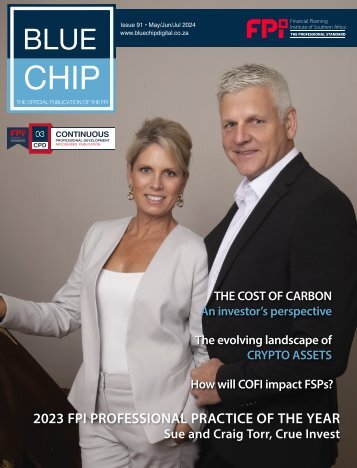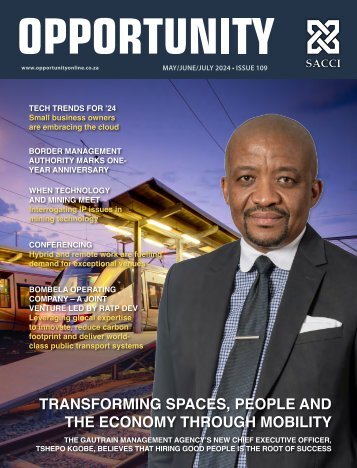South African Business 2016 edition
- Text
- Investment
- Government
- Business
- Development
- Network
- Sectors
- Investing
- Business
- Africa
- African
- Economic
- Manufacturing
- Mining
- Opportunities
- Economy
- Overview
OVERVIEW Chemicals and
OVERVIEW Chemicals and pharmaceuticals Sasol and Aspen are world leaders in their fields. The coal-to-oil plant at Sasol in the northern Free State was established in the 1960s and its success led to the development of many related chemical and fertiliser production facilities. Sasol One, the Sasolburg plant, now produces chemicals while Sasol’s two other plants in Mpumalanga make fuel. The chemical industry as a whole contributes 5% to national gross domestic product. About 60% of earnings are derived from exports. The newest investment by Sasol in the Free State town will be a new ethylene purification unit at Sasol Polymers plant at a cost of R1.9-billion. At full capacity, the plant will produce 48 000 tons per year. Omnia and Kynoch (fertiliser), Karbochem (rubber and carbochemical), Safripol (plastics) and Afrox are among the other major companies operating out of Sasolburg. Omnia’s R1.4-billion nitric acid plant was inaugurated in May 2012, increasing the group’s capacity in this commodity by 40%. ChemCity is a 100% owned subsidiary of Sasol Chemical Industries. The focus is on fine and specialised-chemical and related sectors of the chemical industry. It acts as an incubator for black empowerment and small business development. Access is provided to infrastructure, utilities and a broad range of professional services. At the Sasol complex in Secunda (Mpumalanga), a range of products for fertilisers, explosives and polymers is manufactured. Sasol Solvents operates 12 plants. The by-products of the sugar and forestry processing plants of KwaZulu-Natal benefit the chemicals sector. Illovo Sugar manufactures downstream products such furfural, furfuryl, alcohol, diacetyl and ethyl alcohol. AECI is one of South Africa’s biggest groups in the sector. The two principal divisions are AEL Mining Services (with a large factory site at Modderfontein near Johannesburg) and Chemical Services, which has 20 separate companies. Sasol Chemical Industries makes about 60% of South Africa’s polypropylene. Safripol, which is also based in Sasolburg, is South Africa’s only other producer. More than half of Sasol’s production of 625 000 tons is exported. Foskor is the country’s only vertically integrated phosphates producer. It has a mining operation in Limpopo province (at Phalaborwa) from which it sends raw materials to its acids division in Richards Bay in KwaZulu-Natal. Sulphuric acid, phosphoric acid and phosphatebased granular fertilisers are manufactured there. The Chemical and Allied Industries Association (CAIA) has 162 member companies. CAIA works to improve efficiency, productivity and competitiveness in the chemical sector. This includes looking at how South Africa can start producing higher-value chemicals and how the country can improve its export profile. Another area of research is how to turn mineral feedstock into useful inorganic chemicals. Pharmaceuticals Pharmaceuticals are manufactured primarily in Gauteng and the Eastern Cape. Although there are more than 200 pharmaceutical firms in the country, large companies tend to dominate the field. Aspen Pharmacare (with about 34% of the market), Adcock Ingram (25%) and Cipla Medpro are among the biggest companies. Aspen SA, Africa’s biggest manufacturer of generic drugs, has manufacturing capacity in the Eastern Cape and Gauteng. The Port Elizabeth facility produces about 10 billion tablets per year. The company has a market capitalisation of R80-billion and successful operations in South America and Australia. British firm GlaxoSmithKline is a 19% shareholder in Aspen. The group headquarters of Aspen are located in La Lucia Ridge, north of Durban. SOUTH AFRICAN BUSINESS 2016 96
Engineering Transnet’s R300-billion spending plan is boosting the sector. OVERVIEW South Africa has several companies that offer a wide range of engineering disciplines and are active internationally. National Government’s ambitious infrastructure plans are sure to provide a lot of work in the sector, despite concerns about delays. Transnet is set to spend R300-billion across its several divisions, all of which will call on the skills of Transnet Engineering (TE). By way of example, TE is building 90 new locomotives at its Koedoespoort facility in Pretoria. TE’s new business unit, Port Equipment Maintenance, is a signal of the company’s wider focus. There are 13 000 TE employees at 132 depots and six factories around South Africa. There has been considerable interest in the South African engineering sector from foreign companies. The largest vertically integrated companies are able to cope with large and complex projects. These include Murray & Roberts, WBHO, WSP Group Africa, Group Five, Grinaker-LTA, Basil Read and Stefanutti Stocks. WBHO and Murray & Roberts are among local companies pursuing foreign projects. Business Report announced that Aveng Engineering’s mining subsidiary, Aveng Moolmans, concluded a five-year extension of its contract in the Northern Cape withTshipi Borwa open-pit manganese mine. The second cycle contract extension, which was effective from 1 September 2015, was obtained following an open tender process. Aveng Mining managing director Stuart White, said that Aveng Moolmans was delighted to continue its working relationship at the Tshipi Borwa project. Growth sectors include energy (with two massive new power plants under construction), water (large dams and supply infrastructure) and public housing. Basil Read is building a R1.8-billion housing project north-west of Johannesburg, Malibongwe Ridge. Transnet Pipelines recently completed and operates a 3 800km network of underground, high-pressure petroleum and gas pipelines throughout the eastern parts of South Africa, as well as the infrastructure and property associated with them. This astounding network of underground pipelines includes the refined product network, crude oil, Avtur (jet) and gas. The infrastructure includes five intake points, 13 delivery stations, workshops, maintenance depots and 23 pump stations, all of which are positioned along the routes. One impressive feature of the network is the tank farm at Tarlton, a storage and distribution facility that has a capacity of approximately 30 million litres. This facility is mainly used for cross-border deliveries in Botswana, but it also features a refractionator which is used to process intermixture in order to optimise operations and adhere to stringent fuel specifications. Petroleum products are transported for a number of major clients inlcuding BP, Chevron, Engen, Sasol, Shell and Total. Transnet Pipelines also facilitates new entrants into the pipeline network, including Vuyo, PetroSA, Afric Oil and Khulaco. In addition, methane rich gas produced by Sasol is also transported from Secunda in Mpumalanga to KwaZulu-Natal, where it is used by industries as an alternative energy source. 97 SOUTH AFRICAN BUSINESS 2016
- Page 1:
SOUTH AFRICAN BUSINESS 2016 EDITION
- Page 6:
CONTENTS Introduction CONTENTS Sout
- Page 10 and 11:
CREDITS Publisher Chris Whales Publ
- Page 12 and 13:
SPECIAL FEATURE South Africa A peri
- Page 14 and 15:
SPECIAL FEATURE In a year that saw
- Page 16 and 17:
SPECIAL FEATURE owes its existence
- Page 18 and 19:
SPECIAL FEATURE against water losse
- Page 20 and 21:
SPECIAL FEATURE Operation Phakisa h
- Page 22 and 23:
SPECIAL FEATURE late in 2014. The h
- Page 24 and 25:
SPECIAL FEATURE Understanding Afric
- Page 26 and 27:
INTERVIEW Job creation on track Ala
- Page 28 and 29:
SPECIAL FEATURE Business funding Th
- Page 30 and 31:
SPECIAL FEATURE in turn makes it ve
- Page 32 and 33:
SPECIAL FEATURE Contact: 012 394 18
- Page 34 and 35:
SPECIAL FEATURE Black Business Supp
- Page 36 and 37:
SPECIAL FEATURE The evolution of sk
- Page 38:
SPECIAL FEATURE providing TVET lear
- Page 42:
PROFILE FP&M Seta Facilitating and
- Page 45 and 46:
• The development of a national s
- Page 48 and 49: FOCUS Champions of change Five dyna
- Page 50 and 51: SPECIAL FEATURE The top law firms S
- Page 52 and 53: SPECIAL FEATURE Keeping the BRICS t
- Page 54 and 55: SPECIAL FEATURE Keeping BEPS in che
- Page 56 and 57: SPECIAL FEATURE IPAP in action In 2
- Page 58 and 59: FOCUS THERE’S NO END TO THE BENEF
- Page 60 and 61: INTERVIEW The riches of Africa awai
- Page 62 and 63: INTERVIEW and it could actually be
- Page 64 and 65: PROFILE ECIC exco profiles Profiles
- Page 66 and 67: INTERVIEW The hub of Africa Tim Har
- Page 69 and 70: Key sectors Overview of the main ec
- Page 71 and 72: OVERVIEW from the subsistence farme
- Page 73 and 74: OVERVIEW South Africa produces abou
- Page 75 and 76: South Africa’s looming energy gap
- Page 77 and 78: How will these resources be develop
- Page 79 and 80: Vall exclusive economic zone limits
- Page 82 and 83: OVERVIEW NEED PIC Mining The South
- Page 84 and 85: OVERVIEW Mineral beneficiation The
- Page 86 and 87: PROFILE The Council for Geoscience
- Page 88 and 89: OVERVIEW Energy The South African e
- Page 90 and 91: INTERVIEW Cummins South Africa Cumm
- Page 92 and 93: OVERVIEW Manufacturing Increasing m
- Page 94 and 95: OVERVIEW Automotive International i
- Page 96 and 97: OVERVIEW Automotive components Incu
- Page 100 and 101: OVERVIEW Healthcare South Africa’
- Page 102 and 103: OVERVIEW Water Severe water restric
- Page 104: OVERVIEW Improving quality The intr
- Page 107 and 108: Our Vision is is “Quality water f
- Page 109 and 110: OVERVIEW 107 SOUTH AFRICAN BUSINESS
- Page 111 and 112: OVERVIEW airports in India and Braz
- Page 113 and 114: affords, while maintaining its envi
- Page 115 and 116: kets, except Australia. In Africa,
- Page 117 and 118: Rosebank, Johannesburg, renamed ‘
- Page 119 and 120: Trade with Africa Improved infrastr
- Page 121 and 122: FOCUS MTN plugs R1.2-billion into K
- Page 123 and 124: MTN rolls out fibre infrastructure
- Page 125 and 126: OVERVIEW community engagement. The
- Page 127 and 128: PROFILE For BEE Verification and is
- Page 129 and 130: OVERVIEW attracting and retaining c
- Page 131 and 132: OVERVIEW Small business is taken ve
- Page 133 and 134: Franchise Fund—an innovative plat
- Page 135 and 136: educating young people in fields th
- Page 137 and 138: OVERVIEW Management Plan has divert
- Page 139 and 140: hazardous waste is also not being c
- Page 141 and 142: INTERVIEW yourself up as a Tier 1 o
- Page 144 and 145: OVERVIEW Renewable energy South Afr
- Page 146 and 147: INTERVIEW Plenty of scope for solar
- Page 148 and 149:
LISTINGS South African business org
- Page 150 and 151:
LISTINGS South African National Gov
- Page 152 and 153:
LISTINGS Department of Communicatio
- Page 154 and 155:
LISTINGS Department of Human Settle
- Page 156 and 157:
LISTINGS Department of Science and
- Page 158 and 159:
OVERVIEW Regional overview: Eastern
- Page 162 and 163:
INTERVIEW Buffalo City on the rise
- Page 164 and 165:
OVERVIEW Regional overview: Free St
- Page 166 and 167:
OVERVIEW Regional overview: Gauteng
- Page 168 and 169:
FOCUS A Catalyst for Economic Devel
- Page 170 and 171:
FOCUS business people and tourists
- Page 172 and 173:
OVERVIEW Regional overview: KwaZulu
- Page 174 and 175:
OVERVIEW Regional overview: Limpopo
- Page 176 and 177:
OVERVIEW Regional overview: Mpumala
- Page 178 and 179:
The powerhouse of Africa Mpumalanga
- Page 180 and 181:
Mpumalanga: Key Sectors Mpumalanga
- Page 182 and 183:
Nkomazi Special Economic Zone The N
- Page 184 and 185:
INVEST IN THE PROVINCE OF THE RISIN
- Page 186 and 187:
OVERVIEW Regional overview: Norther
- Page 188 and 189:
OVERVIEW Regional overview: North W
- Page 190 and 191:
OVERVIEW Regional overview: Western
- Page 192 and 193:
FOCUS Khayelitsha - the power of to
- Page 194 and 195:
INDEX INDEX Abeco Tanks ...........
- Page 196:
ENSafrica.com ENSafrica | Africa’
Inappropriate
Loading...
Mail this publication
Loading...
Embed
Loading...























































































































































